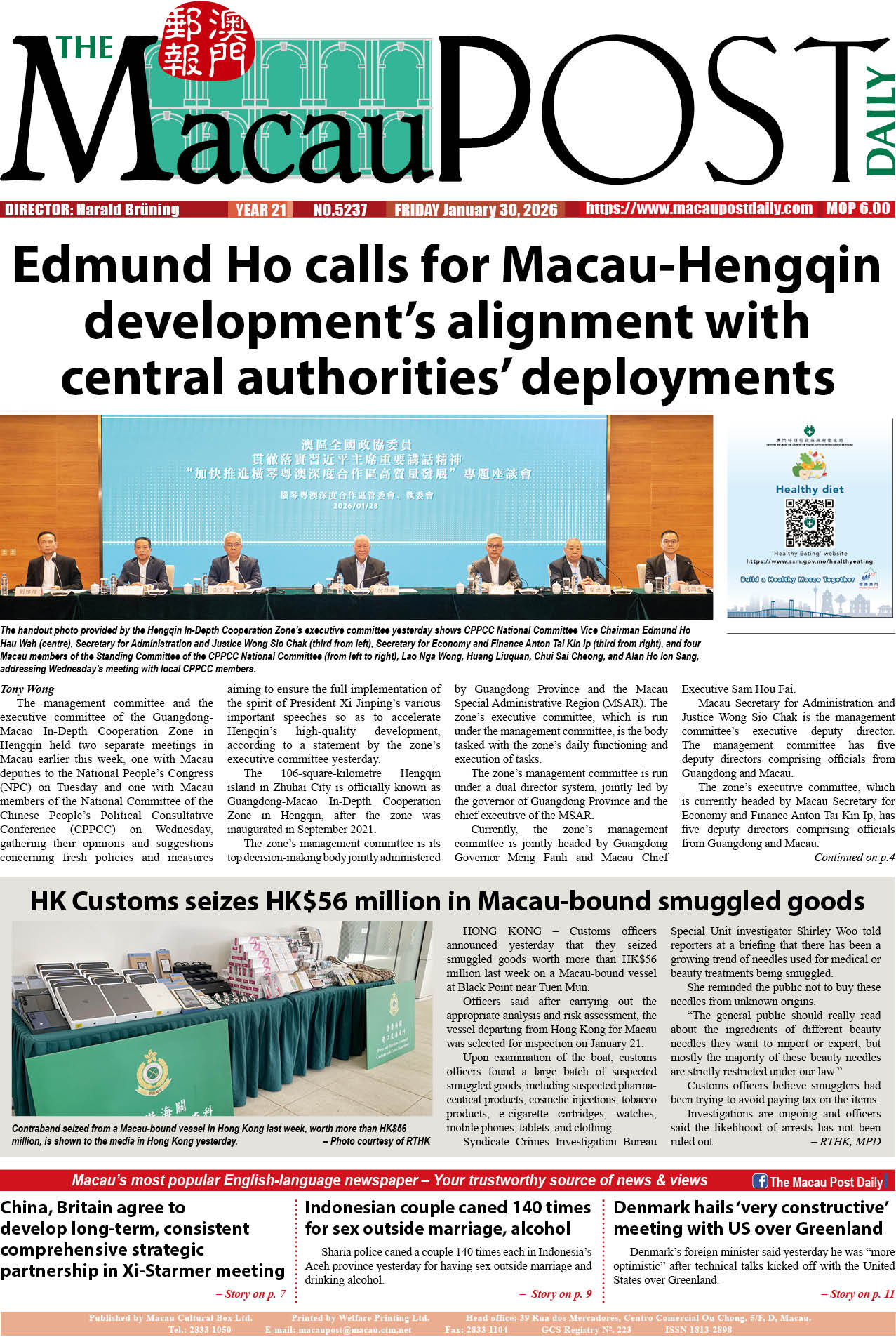Addressing yesterday’s daily press conference about the local government’s ongoing fight against the novel coronavirus (COVID-19) threat, Education and Youth Affairs Bureau (DSEJ) Deputy Director Kong Chi Meng said that the government now expects classes in local schools to resume no later than April 20, as the epidemic in Macau and its neighbouring cities, namely Zhuhai and Zhongshan, has stabilised.
While Zhuhai abuts Macau, Zhongshan lies 40 kilometres north of Macau.
Kong reaffirmed that his bureau has not relaxed its previously-set criteria for when school classes can resume.
The Education and Youth Affairs Bureau first announced its criteria for when school classes could resume in Macau late last month, according to which classes could resume after two conditions have been met. Firstly, no new COVID-19 cases have been confirmed in Macau and Guangdong for 14 consecutive days, and secondly, both the Zhuhai and Zhongshan education authorities have announced the resumption of classes in the two cities.
The bureau said late last month that after the two conditions are met, it will make a formal announcement 14 days before the resumption of classes in local schools.
The bureau said late last month that based on a provisional assessment by the local government about the epidemic in neighbouring regions, it believed that classes in local schools could resume in late April or even earlier.
Changeable criteria
However, the bureau said in a statement on Friday that it did not rule out the possibility of changing its criteria that it would take into consideration when deciding when school classes could resume in Macau. Friday’s statement said that the epidemic in Macau and on the mainland has gradually eased, adding that the bureau believed that “sporadic” new COVID-19 cases would still be confirmed in various regions in the near future. Friday’s statement said that referencing the epidemic in nearer cities, particularly Zhuhai and Zhongshan, was “more indicative” than referencing the epidemic in farther cities when considering the matter on the resumption of classes in local schools.
Macau’s last two COVID-19 cases, the 9th and 10th cases, were confirmed on February 4. All of the 10 COVID-19 patients – seven tourists from Wuhan and three locals – have been discharged from hospital.
During yesterday’s press conference at the Health Bureau (SSM) adjacent to the public Conde de São Januário Hospital Centre, Kong noted that the epidemic in Macau has eased, the city has not confirmed a new COVID-19 case for 35 consecutive days, and all of Macau’s 10 COVID-19 patients have been discharged.
Kong noted that merely a few “sporadic” newly imported COVID-19 cases have been confirmed in Guangdong recently and that no new COVID-19 cases have been confirmed in both Zhuhai and Zhongshan for over 20 consecutive days.
Kong said that after discussions with the Health Bureau, local schools and the city’s major education associations, his bureau now expected classes in local schools to resume no later than April 20. Kong said that if the epidemic in Macau and the two neighbouring cities continues to be stable, his bureau would announce the exact date of the resumption of school classes, at the end of this month.
According to local media reports, since early this month, newly imported COVID-19 cases have been occasionally confirmed in Guangdong, where basically no new local COVID-19 cases have been confirmed since early this month.
Merely a provisional plan
Kong underlined that it was merely a provisional plan to set the date of the resumption of school classes no later than April 20, adding that his bureau could not rule out the possibility of changing the class resumption date due to a possible change in the epidemic situation, after referencing suggestions made by the Health Bureau.Kong also reaffirmed during yesterday’s press conference that his bureau has not relaxed the two conditions previously set by his bureau as to when school classes can resume in Macau.
Kong was quick to add that the epidemic situation in and outside Macau was always subject to change, adding that his bureau needed to formulate and constantly adjust its plan for class resumption “in line with reality”.
Kong said that while the epidemic situation in Macau has improved, Macau now has to face the risk of having COVID-19 cases imported from anywhere around the world. “We cannot adopt an approach of not changing the previously-set criteria merely in order to meet the criteria,” Kong said.
Education and Youth Affairs Bureau (DSEJ) Deputy Director Kong Chi Meng addresses yesterday’s press conference at the Health Bureau (SSM) about the city’s novel coronavirus (COVID-19) situation. Photo: GCS
No tests in first 2 weeks
Kong also said that local schools will not carry out any tests and examinations for their pupils during the first two weeks after the resumption of classes, allowing pupils to gradually get used to campus life again. Kong also said that classes will primarily focus on reviewing lessons during the first two weeks.
Macau’s schools have been closed since the Chinese New Year holiday in late January due to the epidemic. However, local schools – most of which are privately owned – have been conducting online learning sessions for the pupils during the epidemic since early last month. The government has said that the online learning sessions arranged by local schools should focus on reviewing lessons rather than acquiring new knowledge.
Meanwhile, Secretary for Social Affairs and Culture Elsie Ao Ieong U told reporters yesterday after attending a meeting of the legislature’s Follow-up Committee for Public Administration Affairs that the government was studying the possibility of resuming classes in kindergartens, primary schools, lower secondary schools and higher secondary schools in phases. She also said that senior high school pupils preparing for their university entrance examinations would be allowed to go back to school from March 30.
Macau has about 80,000 school pupils – including those in kindergartens – and 35,000 tertiary education students, according to official statistics.








